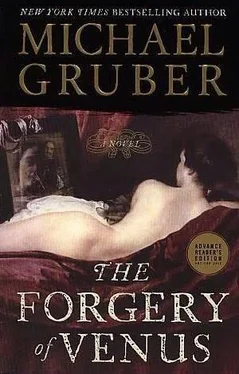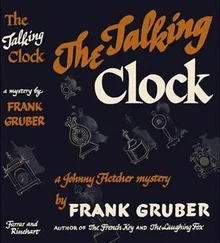“Maybe they’re just thinking about her. It’s a study of contemplation, an example to us who can’t see the Virgin at all.”
“Yes, that’s a good reading. And the art-historical subtext is that if you’re a true artist, like Bellini, you must keep at it and keep your spirit open and the art will feed you, if you let it. Lotte tells me you had some trouble in New York.”
“What did she tell you?”
“Oh, no details, but she suggested that you might be wise to seek the services of a psychiatrist.”
“And this is the reason you looked me up? To check out if I was really nuts?”
“Only partially,” he said with a disarming smile. “And I shall be happy to report you seem perfectly sane. Are you doing any of your own painting, by the way?”
“I don’t know, Maurice-sometimes I think, What’s the point? What does work of my own mean anymore? I look at this thing and there’s a whole coherent culture embodied in it. The illusionistic space; the theatricality, like a stage set; the atmosphere…like you said, he’s learned how to paint air, and he can do it because the art and technique are in service of something greater than the artist. But now there’s nothing greater than the artist-the artist is it . And the critics and the investment potential. If I did something like this, except as a parody, it would be called kitsch. And it would be kitsch.
We don’t believe in the Virgin and the saints anymore, or at least not the way Bellini did. Our icons are blank and the only religion we see in the galleries is irony. I can do irony fine, but it makes me sick.”
“Yes, but my dear man, there is a flourishing school of modern figurative painting, what Kitaj called the school of London-himself, Bacon, Lucien Freud, Auerbach. If you want to paint that way, why not do it?”
“But I don’t want to paint that way. Gin up a little individual style and sell it to fools? I want to paint like this, I want to paint in a culture that transcends the art that expresses it. And all that’s gone.”
He nodded gravely. “Yes. I take your point. And I don’t have an answer to your problem. Still, we’re standing here and we are having a certain experience. Neither of us, I think, are believers in the sense that Bellini was, and yet we are at this moment under his spell. Is it only admiration for his bravura? Are we merely worshipping his art?”
“Or we’re being drugged. You know what Duchamp said about art.”
“Yes, ‘As a drug it’s probably useful for a number of people, very sedative, but as a religion it’s not even as good as God.’ An interesting man, Duchamp, probably the major influence on the art of the past century, after Cézanne, even though he produced very little work. I met him once, you know.”
“Really?”
“Yes, in New York. I was in Greenwich Village and I wanted a coffee and the shop only had one free chair, so I asked the old man sitting there if I could use it. He had a chessboard in front of him, and he said I could sit there if I would give him a game, so I did. It was only after I sat down that I realized it was Duchamp.”
“Did you win?”
“Of course not. He was an international grand master. We played three games, and he won the last while spotting me two rooks. We did not, unfortunately, discuss art. I talked about what I have just been telling you, my work in the art recovery effort, and when I told him that there were dozens of masterpieces that had gone missing, do you know what he said? ‘They are the fortunate ones.’ Everyone thought he’d given up painting entirely, but when he died they found he’d been working on the same painting, a representational nude, for the last twenty years of his life. One looks at it through a peephole.”
“What did he think of his artistic progeny?”
“I wish I’d thought to ask him, but from what he wrote I gather he didn’t have much use for pop or conceptual art. As I imagine these people, the Virgin and the saints, would not have had much use for what the Catholic Church became after their time. We are a bunch of silly monkeys after all, but what an astounding miracle it is that we can also make and enjoy things like this. After the kind of life I have led…you know, there are people who believe that after what Europe has done to itself in the twentieth century, that vast catastrophe, we can no longer have poetry, have art, that this is all meaningless merde because it leads to the death camps. They have a point, I suppose, but, as I was saying, after the kind of life I have led, here I am, in a church, looking at Bellini. Another kind of miracle, perhaps.”
I didn’t know what to say to that, and after a moment he plucked his sleeve back and looked at his watch.
“And now, unfortunately, I must go. I have a meeting at four-at the Gritti, of all places. It’s part of the perpetual EU pagaille about how to save Venice and its treasures from the rising waters.”
“I hope you succeed,” I said.
“Perhaps we will, or perhaps one day there will be fishes swimming through here nibbling at the painted saints.”
We went outside and found it had stopped raining. Winter sun struggled through the thinning clouds, lighting the facades of the church and the surrounding buildings with dramatic effect. Maurice looked about the campo, beaming in delight.
“Now we are in a Canaletto ourselves,” he said, and we embraced. Then he held me by the shoulders at arm’s length and looked me in the face.
“Chaz, I don’t know the extent of your involvement with Herr Krebs, but I would urge you not to get in any further with him.”
“Why? I thought you said he wasn’t a crook.”
“No, I said he had never been caught. It’s not the same thing. But whatever his legal status at present, he is not a person you wish to know. Please take my word for this.”
Ifinished the ceiling just before Christmas and Castelli threw a party for the unveiling of the work. My patrono, I found, looked just like one of those cutthroat condottieri who ran Italy in the quattrocento, a shark face in Armani, and came with an entourage of shady remoras and a blond sweetie twenty years younger who wasn’t Mrs. C. Trailing discreetly along, and looking like he fit right in, was my old pal Mark Slotsky.
So, shitloads of champagne, and later a gigantic seven-course meal under my fresco, a couple dozen rich people, jeweled women, politicians, and so on, and business fascist types. Zuccone informed me that the real Venetians had been invited but declined; all those Golden Book families weren’t going to show up to gaze on Castelli’s fake Tiepolo. I wasn’t invited either. They set up a table in a dusty room near the kitchen for the help, of which I was one, because it was a restoration; the artist was Tiepolo, and he was dead. I mean, you wouldn’t expect the plasterers or the scaffold guy to be in there with the fucking patrono.
And you know, I didn’t feel bad about it at all, I felt great, maybe for the first time in my life I felt I was where I belonged. Guys slapped me on the back and kissed me, all like that. We had a great time too, had the same food, and maybe better wine, courtesy of Zuccone, and got drunk and noisy. It was like the M arriage of Figaro: the real life, decency, honesty, was below the stairs.
Toward the end of the evening, Mark came in and went through an elaborate and, I thought, totally phony apology about how it was outrageous I hadn’t been seated in the frescoed hall, and I was like, it’s okay, Mark, I’m having a great time with the paisans, and then he kind of leaned close and said, “Castelli was real impressed with what you did, amazed really, he had no idea anyone could work like that, I mean it’s fucking perfect, that fresco, you can’t tell it from a Tiepolo except it’s so fresh and clean.”
Читать дальше












